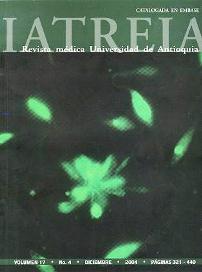Anti- β2 glycoprotein antibodies in patients with antiphospholipid syndrome
DOI:
https://doi.org/10.17533/udea.iatreia.4110Keywords:
Anti- β 2glycoprotein I, Antibodies, Anticardiolipin antibodies, Antiphospholipid syndrome, Recurrent pregnancy loss, ThrombosisAbstract
The objective of this study was to compare the presence of anti-β2glycoprotein (anti- β2GPI) antibodies with the conventional laboratory tests of anticardiolipin antibodies (aCL) and lupus anticoagulant and with the clinical manifestations of the Antiphospholipid Syndrome (APS). In this study 80 women with APS (35 from the Rheumatology Service and 45 with a history of recurrent spontaneous abortion, RSA) were included, as well as 5 women with rheumatic diseases but no APS, 27 RSA-women without APS and 20 healthy women in their reproductive age. The presence of IgG and IgM anticardiolipin antibodies (aCL), anti- β2GPI antibodies by ELISA method and lupus anticoagulant by the test of activated partial thromboplastin time was investigated. Additionally the clinical manifestations associated to APS were registered. In the group of women with APS, 25.7% (9/35) of those with rheumatic diseases and 4.4% /2/45) of the ones with RSA were positive for anti- β2GPI while none of the women without APS or the controls had such positive reaction. There was a significant association at titers of 3+ (highly positive) between the presence of anti- β2GPI antibodies and IgG and IgM aCL in contrast to anti- β2GPI-negative individu als. The positivity of lupus anticoagulant also correlated with the presence of anti- β2GPI antibodies. There was no significant correlation between any specific clinical manifestation and the presence of anti- β2GPI antibodies. In conclusion, the determination of anti- β2GPI antibodies was highly specific in patients with APS but did not associate with any clinical manifestation of the syndrome.
Downloads
Downloads
Published
How to Cite
Issue
Section
License
Papers published in the journal are available for use under the Creative Commons license, specifically Attribution-NonCommercial-ShareAlike 4.0 International.
The papers must be unpublished and sent exclusively to the Journal Iatreia; the author uploading the contribution is required to submit two fully completed formats: article submission and authorship responsibility.














